高二英语必修四unit4语法及unit5 reading要点
高中英语必修4Unit5重点短语解析

高中英语必修4Unit5重点短语解析高中英语必修4 unit5重点词语及短语解析unit 5 theme parkswarming up,pre-reading,reading重点短语解析e to life 活跃起来,苏醒过来;变得有趣或使人更兴奋注意:come to life为不及物动词短语,不用于被动语态,也不用于进行时态。
归纳拓展come back to life/one`s senses 苏醒过来come to yourself 恢复常态come to sb.(主意,办法等)被想出come to sth.合计,共计,达到bring...to life 使……更有趣,恢复生机The wounded soldier came to life soon after he was taken to hospital.那位受伤的战士被送到医院后不久就苏醒了。
The match finally came to life in the second half.比赛在下半场终于精彩起来。
Flowers can bring a dull room back to life.鲜花可使沉闷的房间恢复生气。
The idea came to me in the bath.我洗澡时,想出了这个主意。
2.chargein charge, in charge of, in the charge ofin charge 和in charge of 的意思均为“主管”“负责”,都可用作表语或定语,后者还可作状语。
in the charge of 表示“由……主管”,主语一般是表示事物或单位的名词,of 的宾语用表示人的名词或代词。
如:1. If you take part in the sports meeting,please tell Mark. He is in charge.如果你参加运动会,请告诉马克。
他负责。
2. Mother puts the baby in the charge of the baby sitter while she is out.母亲外出时将小孩交保姆照料。
高中英语必修四unit4知识点
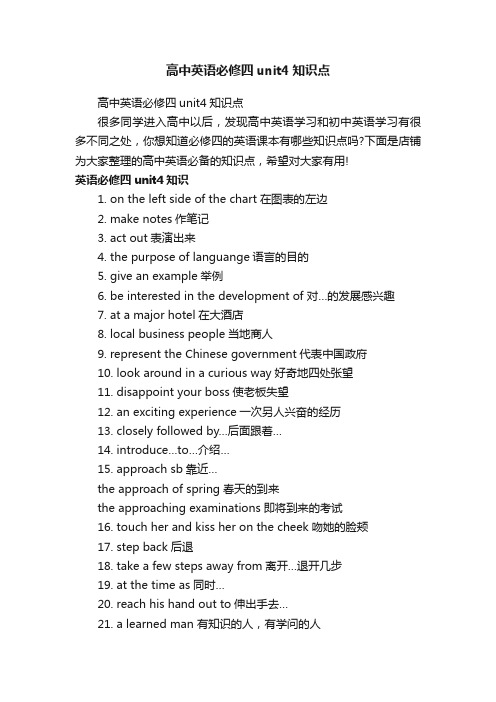
高中英语必修四unit4知识点高中英语必修四unit4知识点很多同学进入高中以后,发现高中英语学习和初中英语学习有很多不同之处,你想知道必修四的英语课本有哪些知识点吗?下面是店铺为大家整理的高中英语必备的知识点,希望对大家有用!英语必修四unit4知识1. on the left side of the chart在图表的左边2. make notes作笔记3. act out表演出来4. the purpose of languange语言的目的5. give an example举例6. be interested in the development of 对…的发展感兴趣7. at a major hotel在大酒店8. local business people当地商人9. represent the Chinese government代表中国政府10. look around in a curious way好奇地四处张望11. disappoint your boss使老板失望12. an exciting experience一次另人兴奋的经历13. closely followed by…后面跟着…14. introduce…to…介绍…15. approach sb靠近…the approach of spring春天的到来the approaching examinations即将到来的考试16. touch her and kiss her on the cheek吻她的脸颊17. step back后退18. take a few steps away from离开…退开几步19. at the time as同时…20. reach his hand out to伸出手去…21. a learned man 有知识的人,有学问的人22. in the same way同样…23. spoken language口语24. express their feelings表达感情25. keep physical distance,保持身体距离高中英语知识重点It 作形式宾语用来替代作宾语的从句、动词不定式、动名词,而把真正作宾语的从句、动词不定式、动名词置于句尾。
人教版高中英语必修4 五个单元语法知识汇总
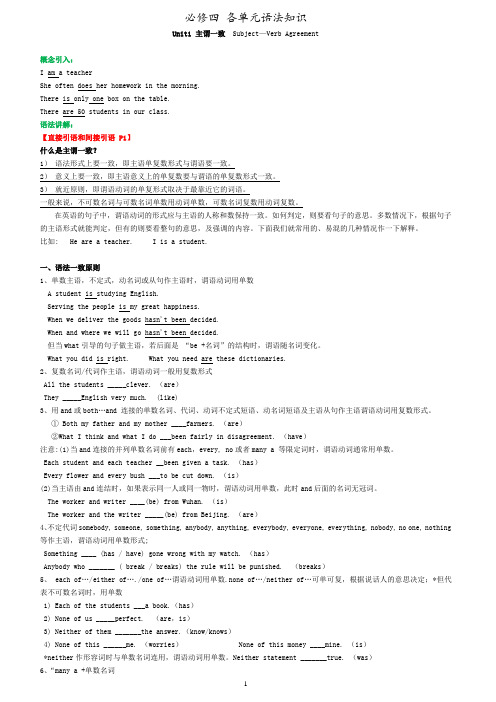
Unit1 主谓一致Subject—Verb Agreement概念引入:I am a teacherShe often does her homework in the morning.There is only one box on the table.There are 50 students in our class.语法讲解:【直接引语和间接引语 P1】什么是主谓一致?1)语法形式上要一致,即主语单复数形式与谓语要一致。
2)意义上要一致,即主语意义上的单复数要与谓语的单复数形式一致。
3)就近原则,即谓语动词的单复形式取决于最靠近它的词语。
一般来说,不可数名词与可数名词单数用动词单数,可数名词复数用动词复数。
在英语的句子中,谓语动词的形式应与主语的人称和数保持一致。
如何判定,则要看句子的意思。
多数情况下,根据句子的主语形式就能判定,但有的则要看整句的意思,及强调的内容。
下面我们就常用的、易混的几种情况作一下解释。
比如: He are a teacher. I is a student.一、语法一致原则1、单数主语,不定式,动名词或从句作主语时,谓语动词用单数A student is studying English.Serving the people is my great happiness.When we deliver the goods hasn't been decided.When and where we will go hasn't been decided.但当what引导的句子做主语,若后面是“be +名词”的结构时,谓语随名词变化。
What you did is right. What you need are these dictionaries.2、复数名词/代词作主语,谓语动词一般用复数形式All the students _____clever. (are)They _____English very much. (like)3、用and或both…and 连接的单数名词、代词、动词不定式短语、动名词短语及主语从句作主语谓语动词用复数形式。
外研社高中英语必修四第五模块reading知识点总结 17张PPT

【归纳拓展】 be to do除了表示"计划或安排将要做某事"外,还可以表示"可能性、必要、责任、 义务、禁止等";其次还表示"没想到,竟然,注定会"等含义,表示将来不可避免地要发 生的事。 *You are to be back before five o'clock. 你要在5点钟以前回来。(表示命令) *If you are to succeed, you must spare no effort. 要想成功,你必须不遗余力。(表示打算) *You are to return the book before the library informs you. 在图书馆通知你之前,你必须把书归还。(表示义务) *What the teacher said was to change her life.老师所说的话竟然改变了她的一生。 (表示命运)
外研版高中英语必修4 Module 5
A Trip Along the Three Gorges
the Three Gorges
the Qutang Gorge the Wu Gorge the Xiling Gorge
cave cliff lake peak plain plateau shore slope valley wood
true.
7. The sun rises in the east and __s_e_t_s_ in the west. 8. A _p_o__e_t__ is someone who writes poems. 9. A _c_o_l_l_e_a_g__u_eis someone who works with you. 10. __B_a__m__b_o__ois a plant which grows quickly and is used
高中英语必修四第五单元知识点总结
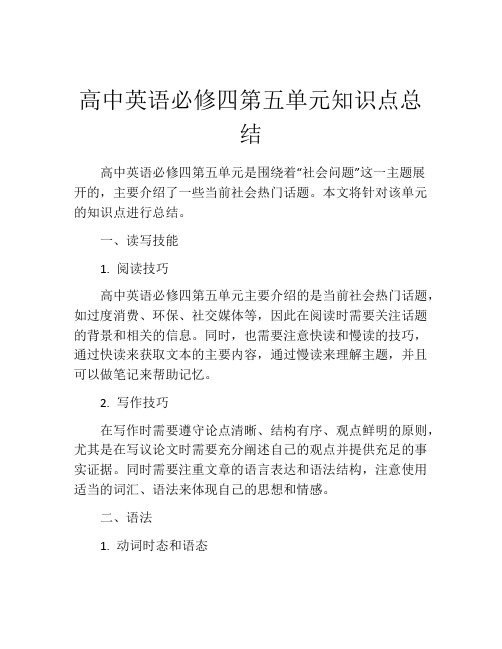
高中英语必修四第五单元知识点总结高中英语必修四第五单元是围绕着“社会问题”这一主题展开的,主要介绍了一些当前社会热门话题。
本文将针对该单元的知识点进行总结。
一、读写技能1. 阅读技巧高中英语必修四第五单元主要介绍的是当前社会热门话题,如过度消费、环保、社交媒体等,因此在阅读时需要关注话题的背景和相关的信息。
同时,也需要注意快读和慢读的技巧,通过快读来获取文本的主要内容,通过慢读来理解主题,并且可以做笔记来帮助记忆。
2. 写作技巧在写作时需要遵守论点清晰、结构有序、观点鲜明的原则,尤其是在写议论文时需要充分阐述自己的观点并提供充足的事实证据。
同时需要注重文章的语言表达和语法结构,注意使用适当的词汇、语法来体现自己的思想和情感。
二、语法1. 动词时态和语态在本单元中,我们需要学习到不同的动词时态和语态的使用方式。
如不同时态的被动语态、使用频率较高的现在完成时等。
学习并掌握这些时态和语态的使用方法可以帮助我们更加准确地描述事件的发生和状态的变化。
2. 情态动词情态动词是描述说话者态度、语气的一种动词。
在本单元中,我们需要掌握几种情态动词的具体用法和含义,如can、could、may、might等。
学习情态动词可以帮助我们更加准确地表述自己的观点和态度。
三、阅读理解1. 提取细节在阅读理解中,我们需要注意提取文本中的细节,包括人物特点、事件发展等。
这些细节可以帮助我们更好地理解和描绘事件的背景和主题。
2. 推理判断推理判断能力是阅读理解中非常重要的一项技能。
我们需要通过对文本中的信息和细节进行推理和判断,来理解和诠释文章的主题和观点。
在推理判断过程中,我们需要注重语境和语义的理解,同时也需要关注对比与类比等逻辑关系。
四、口语表达1. 给予建议在与他人交流时,我们经常需要给予建议。
学习如何给予恰当的建议是重要的口语表达技能之一。
我们需要表达出自己的建议,并且注意措辞和语气的恰当使用。
2. 辩论技巧辩论是一种重要的口语表达形式。
新教材人教版高中英语选择性必修第四册全册各单元重点语法汇总
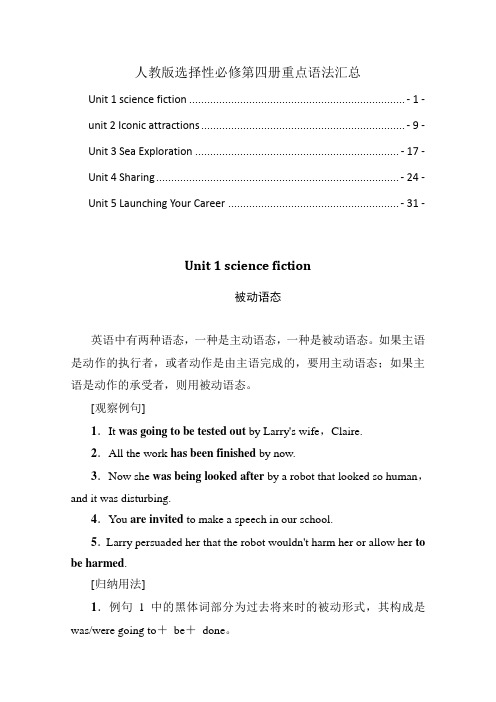
人教版选择性必修第四册重点语法汇总Unit 1 science fiction ........................................................................ - 1 - unit 2 Iconic attractions .................................................................... - 9 - Unit 3 Sea Exploration .................................................................... - 17 - Unit 4 Sharing ................................................................................. - 24 - Unit 5 Launching Your Career ......................................................... - 31 -Unit 1 science fiction被动语态英语中有两种语态,一种是主动语态,一种是被动语态。
如果主语是动作的执行者,或者动作是由主语完成的,要用主动语态;如果主语是动作的承受者,则用被动语态。
[观察例句]1.It was going to be tested out by Larry's wife,Claire.2.All the work has been finished by now.3.Now she was being looked after by a robot that looked so human,and it was disturbing.4.You are invited to make a speech in our school.5.Larry persuaded her that the robot wouldn't harm her or allow her to be harmed.[归纳用法]1.例句1中的黑体词部分为过去将来时的被动形式,其构成是was/were going to+be+done。
高中英语必修四Unit4重点总结

高中英语必修四Unit4重点总结本文档对高中英语必修四Unit4进行重点总结,主要包括以下内容:1. The Speaker's Background 说话者的背景本单元的内容主要关注两个不同背景的人物:Jin Jing和Li Wei。
Jin Jing是一位知名的中国残奥会举重冠军,她在比赛中取得了优异的成绩。
作为一位身体残疾人,Jin Jing以她坚韧不拔的精神和毅力激励着许多人。
Li Wei是一位普通的中国中学生,他对Jin Jing非常崇拜并受到她的影响。
他充满激情地从事自己的学业,并在研究和生活中展现出了积极向上的态度。
2. The Power of Encouragement 鼓励的力量通过Jin Jing和Li Wei的故事,我们了解到鼓励对一个人的成长和发展有着巨大的影响。
Jin Jing在面对困难和挑战时,从她的教练、家人和朋友那里获得了鼓励和支持。
这些正能量激励着她不断努力去追求自己的梦想,并最终获得了成功。
Li Wei通过看到Jin Jing的努力和成就,被激发出积极向上的心态。
他相信自己也可以通过努力和坚持来实现自己的目标,并取得了显著的进步。
因此,我们应该学会在他人面临困难和挑战时给予鼓励和支持,这将激励他们克服困难并取得成功。
3. Facing Challenges 面对挑战Jin Jing和Li Wei的故事向我们展示了面对挑战时的正确态度。
Jin Jing以乐观、坚韧的态度面对自己的身体残疾,不同意放弃自己的梦想。
她通过积极地锻炼和努力训练来改善自己的身体能力,并最终成为一名优秀的举重运动员。
Li Wei在研究上遇到困难时也没有退缩。
他坚信只要努力研究,就能克服困难并取得好成绩。
他通过刻苦研究和寻求帮助,逐渐提高了自己的英语水平。
因此,我们要学会正视挑战并以积极的态度去面对,相信自己的能力,努力克服困难。
只有这样,我们才能取得进步和成功。
以上是本文档对高中英语必修四Unit4的重点总结。
高中英语必修四第四单元重点

高中英语必修四第四单元重点Revised at 2 pm on December 25, 2020.高中英语必修四第四单元重点、难点U n i t F o u r B o d y l a n g u a g e 1、Yesterday, another student and I, representing our university’s student association, went to the Capital International Airport to meet this year’s international students.昨天,我和另一个学生代表我们学校的学生会,到首都国际机场去迎接今年的国际学生。
represent vt. 代表;代理用法归纳:(1)represent oneself as / to be…自称是…;自言He represented himself to be a member of our group. 他自称自己是我们小组的成员。
Don’t repres ent yourself as a leader. 别自称自己是领导。
(2)represent sth. to sb. 阐述;表达Let me represent my idea to you in another way. 让我用另一种方式向你表达我的观点。
Can you represent it to us in detail. 你能详细向我们叙述吗?(3)represent sth. 代表;代理You two will represent our school at the meeting. 你俩个代表我们学校去开会。
2、Tony approached Julia, touched her shoulder and kissed her on the check.托尼走近茱莉亚,摸了摸她的肩,亲了亲她的脸。
必修4unit5-reading[思维导图知识点知识树复习资料]人教版高中英语
![必修4unit5-reading[思维导图知识点知识树复习资料]人教版高中英语](https://img.taocdn.com/s3/m/fd9b9b76f705cc17552709d6.png)
2. According to the text, tourists can find Snow White and Mickey Mouse in __B__. A. World Water Park B. Disneyland C. Central Park D. Camelot Park
总有一款 PPT 适合您
【最新出品 精心整理 倾情奉献 敬请珍惜】
Unit 5 Theme parks
Reading
What do you think of a theme park is? History or culture theme parks
Shenzhen Splendid China
2 Complete the table.
Park name Theme Example of Activities
Disneyland
fairy tale stories
travel through space, visit a pirate ship, meet fairy tale characters, ride a swinging ship, go on a free-fall drop
Disneyland
Para 2
Mickey Mouse and Donald Duck
Snow White and seven Dwarfs are Disneyland _c_a_r_t_o_o_n___ characters.
Free-fall rides
Para 3
_D_o_l_ly_w__o_o_d_ has one of the best old wooden roller coasters, Thunderhead
高二英语必修四知识点

高二英语必修四知识点高二英语必修四是高中英语课程的一部分,主要涵盖了语法、词汇、阅读理解等知识点。
本文将介绍高二英语必修四中的主要知识点,并通过例句加以说明。
1. 时态和语态高二英语必修四中涉及到的时态主要有一般现在时、一般过去时、一般将来时等。
而语态主要包括主动语态和被动语态。
时态和语态的正确运用在英语语法中非常重要。
例句:- I go to school every day.(一般现在时)- She studied English last night.(一般过去时)- They will travel to China next month.(一般将来时)- The book was written by Mark Twain.(被动语态)2. 从句从句是高二英语必修四课程中的重点内容,常见的从句包括名词性从句、定语从句和状语从句。
它们在复合句中起到连接各个分句的作用。
例句:- I believe that he will pass the exam.(名词性从句)- The girl who is sitting over there is my sister.(定语从句)- He was singing while he was cooking.(状语从句)3. 动词的时态和语态动词的时态和语态是高二英语必修四中的核心知识点。
正确的时态和语态的运用可以有效地表达出动作发生的时间和方式。
例句:- She is working in a company now.(现在进行时)- The letter has been sent by him.(现在完成时的被动语态)- He had finished his homework before I arrived.(过去完成时)4. 词汇运用高二英语必修四课程涉及到丰富的词汇,并要求学生能够准确运用这些词汇进行写作和口语表达。
通过积累词汇量,可以更好地理解和运用英语。
人教高中英语必修4Unit5 Reading(共26张PPT)

Then look at the pictures below. Try to match the names of the parks with the pictures. Can you guess which are parks and which are theme parks.
Beihai Park
Dollywood
southeastern America
candy shop, ride on an old steam engine , see bald eagles,
ride on Thunderhead and other
rides
Ancient
watch magic shows, see
Decide if the following statements are true or false, according to the information in the passage. If it is a false statement, rewrite it with correct information.
natural beauty theme parks
1. It's free.
1. We can learn
2. Beautiful scenery can something useful while
keep us free from
enjoying ourselves.
worry and stress. 2. There are many
engine train still working in the
southeastern USA.
5. Camelot Park has an ancient □ □
人教高中英语必修4Unit5 Reading(共16张PPT)

Find out the main idea of each
paragraph.
Para. 1 There are various kinds of theme parks, with a different park for almost everything.
Para. 2 Disneyland
Para. 3 Dollywood
Para. 4 England’s Camelot Park
True or False questions (1)Disneyland can be found everywhere. F (2) You can meet any cartoon character you like
throughout the whole year. T
True or False questions (6)Dollywood has only electric train still working in the USA. F (7) Visitors to Camelot Park can taste candy
Group-work
Park Name Theme
Exampl__f_a_ir_y__ta_l_e__s_to_r_i_e_s_________
1. Traveling through space 2. visiting a pirate ship 3. meeting fairy tale or Disney cartoon
Theme
_h_is_t_o_ry__a_n_d_s_t_o_r_ie_s_o__f _a_n_c_ie_n_t_E_n_g_l_and
人教高中英语必修4Unit5 reading (共35张PPT)

Disneyland in Hong Kong
Mickey Mouse and Donald Duck
Beautiful mermaid
Ocean Park in Hong Kong
One of the biggest aquariums in the world
Window of the World in Shenzhen
Happy Valley in Shenzhen
merry-go-round
Roller coaster
Ferris wheel
slide
bumper car
Pirate ship
bungee jumping
Yunnan Nationalities Villages
Wedding
Festivals
High Temple Park
World Water Park in Canada
Ordinary park High Temple Park Theme park World Water Park
Ordinary park
Ordinary park is a public area of land with grass, trees, etc, where people can walk for fun or children can play.
Group work
Design a theme park in groups of four.
Draw a poster for your theme park and introduce it to us. Name, purpose, and activities of your park should be included.
高中英语必修四Unit4知识归纳
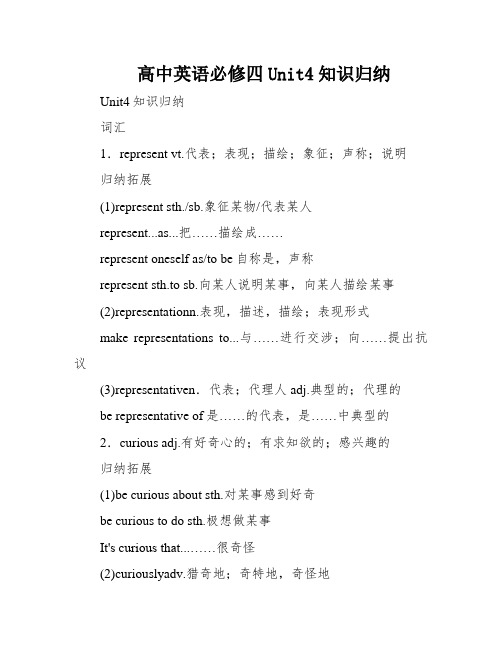
高中英语必修四Unit4知识归纳Unit4知识归纳词汇1.represent vt.代表;表现;描绘;象征;声称;说明归纳拓展(1)represent sth./sb.象征某物/代表某人represent...as...把……描绘成……represent oneself as/to be自称是,声称represent sth.to sb.向某人说明某事,向某人描绘某事(2)representationn.表现,描述,描绘;表现形式make representations to...与……进行交涉;向……提出抗议(3)representativen.代表;代理人adj.典型的;代理的be representative of是……的代表,是……中典型的2.curious adj.有好奇心的;有求知欲的;感兴趣的归纳拓展(1)be curious about sth.对某事感到好奇be curious to do sth.极想做某事It's curious that...……很奇怪(2)curiouslyadv.猎奇地;奇特地,奇怪地curiosityn.猎奇心;猎奇;珍品,奇事in/with curiosity=curiously猎奇地from/out of curiosity出于好奇meet/satisfy one's curiosity满足或人的猎奇心3.approach n.接近,迫临,走近;方法,步调,途径,门路vt.接近,建议;要求,找……商量vi.靠近归纳拓展(1)at the approach of...在快到……的时候make an approach to...对……进行探讨;向……提出要求/建议an/the approach to sth.(待人接物或思考问题的)方法、方式、态度(2)approach sth.与或人联系/磋商某事approach to...接近,近似;约等于;做某事的方法/途径同类辨析approach,way,method与means(1)approach,way,method,means都有“体式格局,方法,途径”之意,但approach偏重指待人接物或考虑问题的体式格局;way为普通用语;means指能够获得结果的手腕、方法;method指有规律的、有条理的做法,如教学方法teaching method。
【推荐下载】高二必修四英语unit4知识点梳理
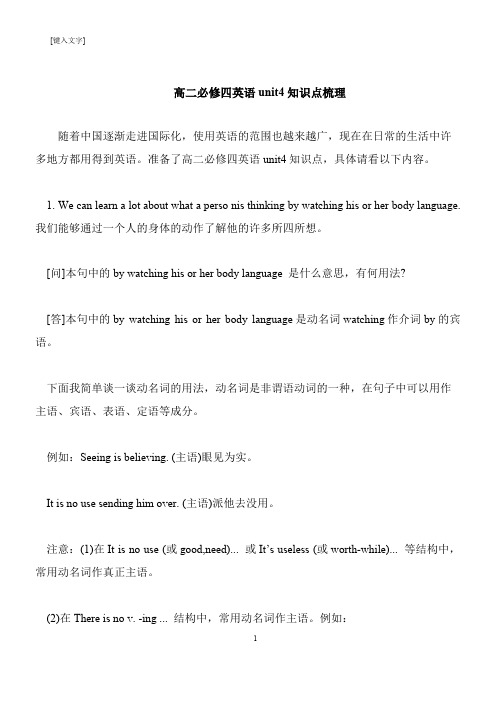
[键入文字]
高二必修四英语unit4知识点梳理
随着中国逐渐走进国际化,使用英语的范围也越来越广,现在在日常的生活中许多地方都用得到英语。
准备了高二必修四英语unit4知识点,具体请看以下内容。
1. We can learn a lot about what a perso nis thinking by watching his or her body language. 我们能够通过一个人的身体的动作了解他的许多所四所想。
[问]本句中的by watching his or her body language 是什么意思,有何用法?
[答]本句中的by watching his or her body language是动名词watching作介词by的宾语。
下面我简单谈一谈动名词的用法,动名词是非谓语动词的一种,在句子中可以用作主语、宾语、表语、定语等成分。
例如:Seeing is believing. (主语)眼见为实。
It is no use sending him over. (主语)派他去没用。
注意:(1)在It is no use (或good,need)... 或It’s useless (或worth-while)... 等结构中,常用动名词作真正主语。
(2)在There is no v. -ing ... 结构中,常用动名词作主语。
例如:
1。
高中英语必修四book4unit5词汇讲解和练习(含答案)

⾼中英语必修四book4unit5词汇讲解和练习(含答案)BOOK 4 Unit 5 Theme parks 词汇讲解及练习题重难点讲解1. theme n(谈话、写作或乐曲的)主题,题⽬,主旋律theme park主题公园theme song主题歌The theme of our discussion today is “Asia in the1990s”.今天我们讨论的主题是⼆⼗世纪九⼗年代的亚洲。
The theme of the poem is love and peace. 这⾸诗的主题是爱与和平。
2 various adj1. 不同的;各种各样的,形形⾊⾊的Various objects were on the table.桌⼦上摆着各种各样的物体。
At the meeting, the people present expressed their various opinions. 会议上,出席⼈⼠发表了不同观点。
Their hobbies are many and various.他们的爱好五花⼋门。
2. 不⽌⼀个的,各个的,个别的for various reasons由于种种原因For vario us reasons, I’d prefer not to meet him. 由于各种原因,我不愿意见他。
Wheat is grown in various parts of the country. 全国许多地⽅都种⼩麦。
【知识拓展】various是由动词vary(变化)派⽣⽽来的形容词,它的副词形式是variously(不同的)。
variety是名词,意为“变化,多变性,多样性”,⽤a variety of/varieties of表⽰“各种各样的;多种多样的”,后接复数名词,可与various互⽤。
如:There are various colours to choose from.That sort of things varies from person to person.3be famous for以/因……⽽出名be famous as作为……⽽出名She was famous for his novels and poetry.她以⼩说和诗歌⽽闻明。
人教高中英语必修4Unit5 reading (共20张PPT)

Learning aim
I can keep the usages of the key words , phrases and sentence patterns of this unit in mind.
重点单词、短语默写
句型必备
根据本单元的重要句型来 仿写例句
[答案]
1.Whatever happened 2.not only ; but also help improve your Chinese
3. some;others 4.whether; or
课文回顾
[答案]
1. to amuse 2. entertainment 3 . variety 4. is based 5. the 6 .It 7. traditional 8. where 9. learning 10. or
10.amusement; 11.attraction 12,advance; 13. admission
短语 1.be famous for 2.be familiar
with 3. come true 4.no wonder 5. have fun 6.be modelled after 7. face to face 8.get close to e to life 10.in advance
单句改错
[答案]
1. we 前加but 2 .第二个as变成for 3. protect改成protecting 4. whatever改成whichever 5. 去掉fun前的a 6. park改成parks 7. 去掉others 前面的the 8. them 改成which或mnd more accurate
必修四unit4-Reading[思维导图知识点知识树复习资料]人教版高中英语
![必修四unit4-Reading[思维导图知识点知识树复习资料]人教版高中英语](https://img.taocdn.com/s3/m/60a5df1ddd88d0d233d46add.png)
◆Body language goes with
no words .
◆ Body language is actions that can communicate ideas without use of words.
Read one’s mind( 察言观色)
6. Men from all Muslin countries will not shake hands with women.F
7. From the passage we can see western cultures are better than eastern cultures. F
gesture
posture
eye contact
facial expression
What are the following facial expressihappy
surprise
angry
fear
What do people in different countries usually do when meeting?
Coulon from France twice on
knows
each cheek
What do people in different countries usually do when meeting?
countries Ways to greet each other
Columbia
Japan canada
they talk
Answer the questions.
1. Why are the international students coming to China?
高中英语必修四Unit4知识要点回顾

高中英语必修四Unit4知识要点回顾本文档回顾了高中英语必修四Unit4的知识要点,以下是重点内容概述:1. 词汇:本单元的词汇主要包括历史事件和文化方面的词汇。
学生需要掌握这些词汇的拼写、发音以及用法。
词汇:本单元的词汇主要包括历史事件和文化方面的词汇。
学生需要掌握这些词汇的拼写、发音以及用法。
2. 阅读理解:本单元的阅读理解重点是理解文章中的主旨、细节和推理等,同时也需要学生提高阅读速度和理解技巧。
阅读理解:本单元的阅读理解重点是理解文章中的主旨、细节和推理等,同时也需要学生提高阅读速度和理解技巧。
3. 写作技巧:本单元要求学生以辩论的方式撰写文章,并且要能够清楚陈述观点并支持自己的观点。
学生需要学会使用适当的过渡词语和句子结构。
写作技巧:本单元要求学生以辩论的方式撰写文章,并且要能够清楚陈述观点并支持自己的观点。
学生需要学会使用适当的过渡词语和句子结构。
4. 语法重点:本单元的语法重点是情态动词和虚拟语气的用法。
学生需要掌握情态动词的不同用法和虚拟语气的表示方式。
语法重点:本单元的语法重点是情态动词和虚拟语气的用法。
学生需要掌握情态动词的不同用法和虚拟语气的表示方式。
5. 听力训练:学生需要通过听力练来提高自己的听力技巧,包括理解对话中的信息以及提取关键词汇和句子。
听力训练:学生需要通过听力练习来提高自己的听力技巧,包括理解对话中的信息以及提取关键词汇和句子。
通过对这些知识要点的回顾和巩固,学生可以更好地理解和掌握高中英语必修四Unit4的内容。
在学习过程中,建议学生通过阅读相关材料、参加讨论和练习来提高自己的英语能力。
高中英语必修四第1-5单元重点词汇及语法(完整版)
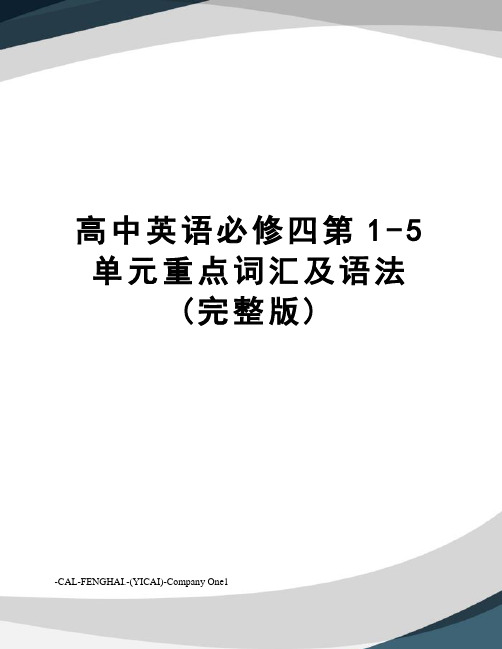
高中英语必修四第1-5单元重点词汇及语法(完整版)-CAL-FENGHAI.-(YICAI)-Company One1Unit 1 Women of achievement1.achieve v. 完成,达到;实现,获得achievement:n.完成;达到;成绩;成就e.g He will never achieve anything if he doesn’t work hard.不努力工作他什么也做不成。
The company has achieved a 100% increase in profitability.这个公司在利润方面获得了百分之百的增长We felt a great sense of achievement when we reached the top of the mountain.当我们到达山顶的时候,我们有一种很大的成就感。
2.connection: 联系;关系;连接物;连接,联结(with/between) Pl. 亲属;亲戚e.g There is a strong connection between smoking and heart disease.吸烟和心脏病之间有很大的联系。
The company has a connection with a number of Japanese firms.这个公司和日本的好多公司有联系。
This town has very good road and railway connections with the coast.这个小镇和海岸之间有着很好的公路及铁路连接。
She ‘s English but she has Irish connections.她是英格兰人但她有爱尔兰的亲戚。
in connection with: 有关e.g In connection with your request of March 3, we are sorry to tell you that we can’t give you a reply until the manager comes back next week.关于你三月三日的请求,很抱歉地告诉你直到下周经理回来我们才能给你答复。
- 1、下载文档前请自行甄别文档内容的完整性,平台不提供额外的编辑、内容补充、找答案等附加服务。
- 2、"仅部分预览"的文档,不可在线预览部分如存在完整性等问题,可反馈申请退款(可完整预览的文档不适用该条件!)。
- 3、如文档侵犯您的权益,请联系客服反馈,我们会尽快为您处理(人工客服工作时间:9:00-18:30)。
Grammar--现在分词作定语表示一个正在进行的动作,可转换为定语从句。
Grammar--现在分词作状语通常表示主语正在进行的另一个动作,用来修饰谓语动词动作,表示时间,原因,条件,方式或伴随等。
Hearing the news, they all jumped with joy. (表时间)Being ill, I went home. (表原因)Following the teacher, we entered the lab. (表伴随)Turning to the left, you will find a school. (表条件)Unfortunately his father died, leaving the family even worse off. (表结果)1 Walking along the street, I came across a friend. (表时间)2 Being poor, he couldn’t afford a TV set (表原因).3 Working hard, you’ll surely succeed. 表条件)4 The boy sat in front of the farm-house, cutting the branch. (表伴随)5 He came running back to tell me the news. 表方式)6 The child slipped and fell, hitting his head against the door 表结果)注1:分词作状语时,其逻辑主语须与句子的主语一致.但独立成分:Generally / Strictly / Honestly speaking,Judging from…, Considering… 除外. Generally speaking, the plan is practical.Judging from his appearance, he seems to be astrong man.Considering his age, he is very active.注2注3:“with + 名词(或代词宾格)+ 分词” 结构也可表示时间、原因、伴随状况。
注4: 否定式:not + 分词Not knowing her address, we couldn’t get in touch with her.注5: 分词表示的动作在谓语所表示的动作之前发生, 则用完成式: having done (主动) / having been done (被动).Having lived in Beijing many years, he knew the city well.Not having received an answer, he decided to write another letter.分词的时态与语态Unit51 There are various kinds of theme parks, with adifferent park for almost everything:…….主题公园有不同种类,不同的公园有不同的主题,几乎囊括了一切……various (adj.) 各种各样的,不同的鸡蛋有各种各样的做法。
There are ________________________________.许多人说他们目睹了这次的事故。
__________________ they had seen the accident.variety n. 多样化,变化, 种类a variety of / varieties of 多种多样的= variousHe failed to come for a variety of / varieties of /various reasons.vary (v.) 改变,变动vary from…to…在…之间变化vary in sth 在某方面变化(不同)2. Whichever and whatever you like, there is a theme park for you! 无论你喜欢哪一个,不管你喜欢什么,都会有一个适合你的主题公园。
whichever 和whatever 都可引导名词性从句,意为“无论哪个/无论什么”无论他做什么都是对的。
Whatever he did was right.你喜欢哪个座位就挑哪个.Take _______________________.你们需要什么样的农具,都可以拿.You can take _____________________________.whichever 和whatever 都可引导状语从句,意为“不管哪个/ 不管什么”不管哪边赢,我都会很高兴。
Whichever side wins, I shall be glad.不管你做什么,不要泄气.Don’t los e heart, whatever you do.不管发生什么事,我们决心完成任务.We are determined to fufill the task , whatever happens.3 The theme park you are probably most familiar with is Disneyland .可能你最熟悉的主题公园就是迪斯尼乐园。
be familiar with...... 熟悉…be familiar to ...... 为.....所熟悉a familiar voice / faceYang Liwei is a name familiar to everybody in China .He is familiar with the house.4. As you wander around the fantasy amusement park, you may see ……①vt. 使欢乐,娱乐,消遣amuse sb. by sth.②adj. amusing (物)amused (人)be amused at / by sth.以…为乐③to one’s amusement 使某人好笑的是I did some crosswords to amuse myself on thejourney .在旅途中,我以玩纵横字谜为消遣。
使她好笑的是,那个演员的假发(wig) 掉了.To her great amusement, the actor’s wig fell off.5 With all these attractions, no wonder tourism is increasing wherever there is a Disneyland. 有这么多引人入胜的东西,难怪哪里有迪斯尼乐园,哪里的旅游业就会发展。
1 attraction n. 吸引力/ 吸引人的东西(景点)The cinema has no attraction for me.The Great Wall is a major tourist attraction.v. attract adj. attractiveattract one’s attentionan attractive theme park6. No wonder + 句子,意为“难怪…”= It is no wonder that clause你天天上课睡觉, 难怪你考试不及格。
You sleep in class every day. It is no wonder thatyou’ve failed in the exam.It’s a wonder that …奇怪的是…奇怪的是,过了这么多年之后你还认得我。
It is a wonder that you recognized me after all theseyears.7 uniqueadj. 独一无二的;独特的a unique experience一次独特的经历The problem is by no means unique to this region.unique talents / contribution to medical sciencea unique knowledge of ancient European coins8 preserveVt. 保存;保留;保护;防护;维护N. 保护区Salt and spices help to preserve meat .盐和调味品有助与保存肉类。
preserve forests / one’s eyesight / orderHe always preserves the style of hard struggle.This is the world’s largest natural preserve.9 lengthn. “长度;长”a pigsty 15 metres in length and 5 metres in width一个长15米宽5米的猪圈拓展:at length 最后,终于;详细地speak at great length 详细地讲了好久They debated this subject at length.他们对这一题目进行了详细的辩论。
10 deed n. 行为(可数)Deeds are fruits, words are but leaves.He is remembered for his many good deeds.11 be modeled after 模仿,仿照The painter modeled his style after that of Picasso.The country’s parliament is modelled after the British system.12 Then visit the farm area, and learn how people inancient England ran their farms and …run v.1. It is not easy for a housewife to run a house管理2. The river was running very slowly.流淌3. He ran a race with me just now. 参加(赛跑)4. He ran away like an arrow. 奔跑5. His job is to run a taxi. 开(车,机器)6. Will the colours in this dress run if I wash it?褪色。
